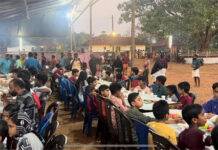Train journeys often offer the best glance into the mood of the nation, the article that follows narrates the experience of a train journey and the ways in which it revealed the issues and expectations of people ahead of the upcoming elections.
Kunal Shahdeo is a Doctoral Researcher at TISS/Mumbai.

[dropcap]I[/dropcap] love train journeys. I spent my childhood living near the Ranchi railway station. Trains became an important part of my childhood memory. I remember every evening my father used to take me to the railway station to see the trains and used to tell me about the destination of different trains.
My daily visit to the railway station used to end with a handful of salty peanuts purchased from the local vendor roaming about the platform. I remember the first time I travelled in a train and nothing could control my excitement. The moving trees, the rice and wheat fields, the vendors selling tea and samosa, the constant chatter that could be heard among the people in the compartment, everything attracted me.
The train journey was a space for the mingling of strangers. People spoke to each other about their lives, politics and everything else. Train journeys allowed the space for strangers to relate to each other. Of course, trains were often running late, trains were overcrowded, toilets were not clean and there were other problems with Indian railways. The debate, discussion and deliberations among strangers that train journeys allowed remained the most fascinating aspect of travelling by the train for me.
I grew up and started travelling in the train to different places alone. I never felt lonely or bored in the train. My fascination with train journeys continued for some more years until the electronic gadgets took over our lives completely in the early part of this decade. Everyone now carries a mobile phone, which allows us to feel entertained during the course of the journey, but it also cuts us off from the fellow passengers and the amazing visuals outside the train. It allows everyone to maintain their privacy at the cost of being disconnected with the fellow passengers and the environment around them. I have also started to feel burdened by train journeys now, it does not excite me anymore, and my love affair with train has become strained. I too spend most of my time while travelling passively consuming “entertainment” provided by electronic media. However, my recent journey from Delhi to Mumbai in Rajdhani Express pleasantly surprised me by bringing back what I thought had become part of my past- engaging discussion among strangers over diverse topics.
Rajdhani Express of Indian railways caters to the middle class population of India because of its exceptionally inflated ticket prices, which automatically excludes poorer sections of the society. People travelling in this train generally belong to the broad category of middle class population in India and hence share a certain kind of lifestyle with each other despite differences of various sorts. These people due to their class position have access to latest electronic gadgets and show signs of a certain notion of privacy.
They often try to insulate themselves from other passengers and surrounding while travelling. However, in this journey I found that my compartment was bustling with noise due to constant chatter among the passengers, which forced me to move down from my heavenly seat in the upper berth of the compartment.
I saw four young men and two middle-aged men engaged in a serious discussion about the upcoming general election. I got excited and became part of the discussion. I could also hear similar discussion going around in other part of the bogey. Smartphone and its relationship with its owners got strained; people were relating to one another as real humans made up of flesh and blood. Soon a Guajarati businessperson who was travelling to Surat offered snacks to everyone and to my utter surprise; everyone except one accepted his offering happily.
In these times of suspicion and fear, these simple acts of sharing among strangers have become a rarity. The debate continued about development of India over the years, and current politics around it. Meanwhile, the caretaker of our bogey arrived to ask us about our food preference for the dinner; it could be either ‘veg’ or ‘non-veg’ food.
One after the other everyone expressed his preference. Coincidently everyone there was vegetarian except me. Their eyes turned towards me when I declared that I want chicken for dinner. Without paying much attention to that, I concentrated on the ongoing debate. Soon I realised that the debate was converging towards one direction, which happened to be that the Modi government has worked really well in the past five years and needs another term to undo the ills done by Congress over the years (At this juncture, I decided to hide my JNU connection so that the debate did not get focussed on me).
The Gujarati Businessman seemed to agree with the Delhi based event manager when he expressed that there is no alternative to Modi. The young MBA student agreed with the CISF Jawan who was returning to his duty from home when he said we need a strong leader like Modi to lead the country.
The middle aged railway employee proclaimed that our country is facing secession issues in Kashmir and North -East and Naxal problem in Central India and hence a patriot like Modi was required to deal with these issues, everyone engaged in the discussion agreed to him. My excitement about the debate started to fade away and my mind started to think about the ‘saffronised’ nature of the public sphere, which has started to dominate public opinion in these times.
What was connecting all these people was their middle-class affiliation and more importantly their support for a political party like BJP promoting Hindutva nationalism. One could ascertain that exclusionary attitude towards Muslims while expressing their support to Modi. This debate among people in concrete space was no different from the one, which happens in social media today. The ‘saffronized’ public sphere of the virtual world was not different from the real world. The virtual and the real world feed on each other and constitute each other.
There was a twist to this debate when an old Muslim man with beard and skullcap boarded the train at Mathura and occupied his seat in the compartment. There was an awkward silence that followed his arrival and the debate ceased suddenly. The old man appeared to be well educated and very polite in his demeanor. The discussion about the upcoming election again started and the old Muslim man joined the debate to make it more interesting. He said that he has no problems with BJP or Modi per se but they have not done what they had promised. Soon, he was bombarded with questions about problems in Muslim community. Terrorism and triple- talaq occupied the centre-stage. He patiently explained the nitty-gritty’s of triple- talaq to the audience which was well informed about it through whatsapp and social media. He condemned any kind of terrorist activities in the name of Islam. He constantly used terms like “humara desh” “humara sarkar” “humlog” to express his belongingness to the Indian nation and Indian society. I wondered why he has to explain everything to the strangers in the train who are suspicious of his beliefs and intentions. He had to express the love for the country overtly and remain subtle about his criticism of the present government.
The middle class Hindus who were questioning him saw themselves as naturally being patriotic and could express their support for Modi aggressively. One instance I vividly remember when the Delhi based event manager argued that Kanhaiya Kumar is against the country and still getting huge sum of money through crowd funding to fight the election, to which the old Muslim man replied that he is not against the country but against the parties and politicians who are not running the country properly. He had to go through an intense round of interrogation by the fellow passengers after this. It was time for the dinner now, which stopped the debate, and everyone went off to sleep after that.
I occupied my upper berth and started thinking about the debate and discussion, which took place. I was happy at one level, seeing strangers engaging in discussion with each other, at the other level, I wondered about the exclusionary attitude, which a large section of Hindu urban middle class has developed in today’s times. This section of the population has a decent standard of life, educated, consumption driven, highly aspirational, and hence susceptive to “dream sellers”. There political leaning is not unconnected to their class position and their religion often defined in terms of following technocratic problem- solving celebrity babas.
Their consumption of so-called ‘nationalist’ products is not unconnected to the kind of media exposure they have. The neoliberal market, new forms of religious practices and the virtual world in which one spends considerable amount of time converge to constitute “people” who provide overwhelming support to the hindutva strand of politics promoted by BJP. There is another side to this story, where Muslims are seen to be the “other” and effectively excluded as the second-class citizens of this country. They have to always prove their loyalty to the country and express their criticism in polite and subtle ways. The public opinion on which any democracy bases itself is overtly showing its majoritarian tendencies. The bigotry of our society, which was hidden all this while, is showing its brutal face confidently post 2014.
The sheer restlessness among people when this election is approaching hints towards the importance of this election and what is at stake in this election. The communal tension, which ahs been increasing since 2014, has reached threatening proportions before the general elections.
Communal polarisation before elections is not new in India but there is something new about it this time around. The confidence with which people are expressing their majoritarian views is unprecedented.
This confidence has a lot to do with BJP’s thumping win in 2014 election and the nature of leadership since then. I hope and pray that the pathological and exclusionary views that were expressed in the discussion in the train are defeated and the idea of India, which our constitution builders created, prevails.













